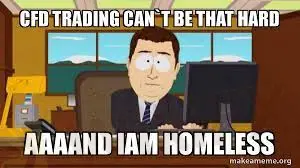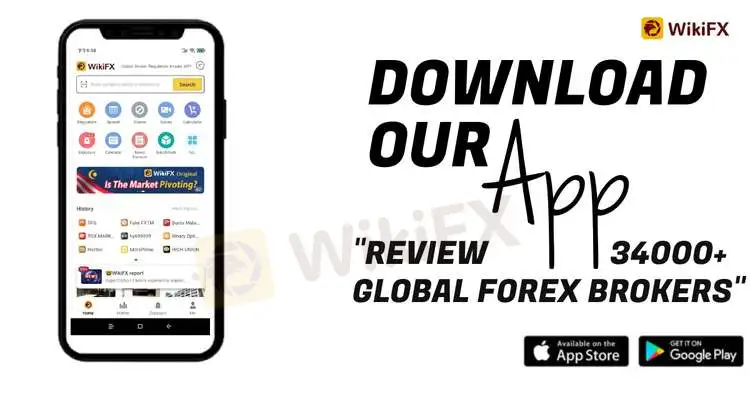简体中文
繁體中文
English
Pусский
日本語
ภาษาไทย
Tiếng Việt
Bahasa Indonesia
Español
हिन्दी
Filippiiniläinen
Français
Deutsch
Português
Türkçe
한국어
العربية
Choosing the Best Forex and CFD Broker
Abstract:Huge volume makes foreign exchange the world’s largest and most popular financial market, with more than $5 trillion in transactions each day. Despite this massive footprint, forex traders don’t access centralized exchanges to execute their buy and sell orders.

Instead, they have to trade through a financial services organization, known as a forex or CFD broker. These businesses act as ‘intermediaries’ or middlemen, perfectly explaining their function and importance in the trading process.
New traders have literally hundreds of brokers to choose from when opening a forex or CFD account. This diversity makes it harder to find a perfect fit for an individual‘s skill level, educational needs, and initial trading stake. To assist in your investigation, we’ve organized a checklist to print out and keep at your desk, identifying key factors to review when choosing a forex or CFD broker.
KEY POINTS
A robust trading platform is needed to trade our modern electronic markets.
Good brokers offer resources and value-added services that support the clients objectives.
Choose a broker who is regulated and disciplined by a local regulatory body.
Match the broker choice with your skill, experience, and capitalization level.
Look for hidden costs before opening a brokerage account.
Investor Protection & Regulations
Look at regulation and domicile when selecting a forex or CFD broker, examining the firm‘s home page for compliance with competent regulatory agencies (see ’How Do Brokers Make Money). A regulated broker has met operating standards imposed by the regulatory body in the country or zone of domicile (headquarters).
Standard regulatory requirements include adequate capitalization, segregation of accounts in order to protect client funds, and annual filings that can be easily accessed by applicants. Additionally, regulation provides reimbursement up to a statutory amount if the firm becomes insolvent and ensures the broker upholds rigorous standards as a financial service provider.
Major countries/zones with financial regulatory agencies, backed up with strict enforcement:
Australia (ASIC)
Eurozone (ESMA and local regulators)
India (SEBI)
Japan (FSA and JSDA)
Switzerland (FINMA)
U.K. (FCA)
U.S.A. (CFTC and SEC)
Tradable Products
Examine the list of tradable currency pairs before choosing a forex or CFD broker. At a minimum, the brokerage should offer all major currency pairs (EUR/USD, USD/JPY, GBP/USD, USD/CHF) and cross-currency pairs, as well as so-called commodity currency pairs (USD/CAD, AUD/USD, NZD/USD). Traders who take exposure solely in these instruments won‘t need a long list of minor pairs from faraway places that aren’t of interest.
However, a robust list reflects a brokers willingness to go the extra mile in providing customers with the opportunity to trade lesser-known pairs when a shock event or other market mover hits that part of the world. For example, the USD/MXN pair attracted huge buying and selling interest when the United States renegotiated NAFTA with Mexico and Canada. Just keep in mind that minor and exotic pairs usually incur much wider spreads and higher commissions.
Look at the margin and leverage offered for each currency group. European regulations have capped margin on forex and forex CFDs since 2018, with a 30:1 limit on major currency pairs and 20: 1 limit on non-major currency pairs. Make sure to read the fine print because EU-regulated brokers are also required to prominently disclose the percentage of clients who lose money and provide negative balance protection to ensure the account never drops below 0.
Account Opening
Opening a ‘live’ account at most brokerages will require personal information about your current income, savings, marital status, trading experience, and risk tolerance. Youll also have to provide minimum opening account capital, which varies from broker to broker.
On the other hand, a free demo account just requires a name and email address, giving potential customers an opportunity to ‘kick the tires’ before committing real money. In many venues, you can go through an instant ID verification process and access the live platform in just a few minutes. In the United States, applicants also have to provide a social security number for tax purposes.
Forex and CFD brokers may also offer tiered account options that cater to different risk, capitalization, and experience levels:
Micro Account: One lot is equivalent to 1,000 units of the traded instrument.
Mini Account: One lot is equivalent to 10,000 units of the traded instrument.
Standard Account: One lot is equivalent to 100,000 units of the traded instrument.
A low minimum initial investment is required to open a Micro or Mini account. The Standard account requires a higher initial investment, although the minimum varies from broker to broker. Given these tiers, its best to select a trading account that is commensurate with your investment capital.
Deposits & Withdrawal Options
The new account can be funded through personal check, debit card, ACH, wire transfer, or an online service like Paypal or Skrill. Some brokers will allow credit card funding but thats no longer typical. Many brokers also let clients choose their base currency, which will be the country of origin in most cases. Funding completed through personal or bank checks may delay account access until those funds clear.
Withdrawal options vary from broker to broker and can be hard to find at web sites. This is often intentional, with the broker seeking to hide fees and standard delays in access to withdrawn funds. Processing times can vary from 24 hours to several weeks, so read the fine print closely to avoid frustration. Withdrawals are also subject to minimum amounts that vary from broker to broker and, in most cases, must go through the originating funding source, due to money laundering considerations.
Web/Desktop Platforms
The trading platform is the clients gateway to the forex market so the applicant must ensure the interface performs all of the functions needed to trade profitably, and is reliable, with few complaints of outages on public forums. Many brokers provide a choice of platforms but the majority of newcomers should stick with the default, at least at the beginning. Also look for desktop and web versions that offer equal functionality.
Most platforms are provided through third party solution providers like MetaQuotes Software, the forex industry‘s standard-bearer. Some brokers also build ’in-house‘ proprietary platforms, in an attempt to differentiate themselves from industry rivals. A proprietary platform often provides a host of features not found on a standard platform, added in reaction to input from the broker’s client base.
Look for these standard features on all trading platforms:
Comprehensive charting package
Customizable watch lists
Wide range of technical indicators
One-click trading
Sophisticated order entry
Risk management tools
Portfolio management
These features play a crucial role in ensuring the new trader enjoys a seamless and productive trading experience. Even so, it‘s a matter of personal choice because most platforms offer the same bells and whistles. The broker’s free demo account provides a perfect way for applicants to find the best fit for their experience and capitalization level. Walk away and don‘t look back if the broker doesn’t provide a demo account.
When looking for a forex or CFD broker, you‘ll quickly discover the huge popularity of MetaQuotes Software’s MetaTrader, which is now offered at more than 80% of all brokers in the United States, Europe, and Australia. This mature platform is a perfect choice for new forex traders due to easy customization, robust charting, and an API that supports hundreds of add-ons. The platform is also available by desktop, on the web, and through mobile devices, allowing easy synchronization while on the go.
Mobile Trading Platforms
All forex and CFD brokers should provide slimmed-down mobile trading platforms so you don‘t have to stare at a computer screen all day. These should automatically synchronize with desktop and web versions but don’t expect all the features of bigger platforms. Major platforms, including Metatrader, now offer mobile and tablet versions for Android and iOS. Note that some brokers will ‘self-brand’ popular mobile platforms so you might need to read the fine print to find the apps origin.
Trading Features
Brokers try to distinguish themselves from industry rivals by offering additional, value-added services that include free market analysis, real-time news feeds, live streams, and trading signals. Most of these services are provided free of charge but brokers may require minimum account size for access.
Applicants should make a checklist of advanced features when shopping for a broker. In addition to standard add-ons, look for tools that include market scanners, VPNs, and notification alerts. Also check for discounts or free trading for high volume customers. Many traders look for advanced charting or alternate platforms that go beyond the capabilities of standard offerings. Some brokers even offer third-party integration so real-time data can be used in an ‘off-the-shelf’ platform, like Elliott Wave software.
Day traders and scalpers also benefit from specialized value-added services. Given time frames for these strategies, look for a diverse selection of instruments to scout for short-term trading opportunities. These can include a signal service, tools like an economic calendar, market news filtering, and real-time earnings releases.
Commissions & Spreads
Unlike the majority of financial markets, forex and CFD brokers usually profit through spreads rather than commissions, explaining why many of these folks advertise their services as ‘commission-free’. Brokers make money by taking the spread for each buy and sell transaction passing through their hands. The spread marks the difference between the buying price and the selling price. For example, if the bid/ask for the EUR/USD currency pair is priced at 1.0875/1.0878, the spread is 1.0878 – 1.0875 = 3 pips.
As a forex trader, you will come across three types of cost structures. The type you receive will depend on the brokers business model:
Fixed spread: the spread doesnt change as price fluctuates so you know the cost before you trade.
Floating spread: the spread is variable, stretching and contracting in reaction to market volatility.
Commission: calculated as a percentage of the spread. You should know this cost before you trade.
Traders looking for predictability with transaction costs prefer fixed spreads. Conversely, traders looking to save money through the entry and exit timing prefer floating spreads. Ultimately, specific trading needs and transaction history will determine the right choice.
Bonus & Promotions
Brokers may offer account bonuses that include a month or more of no-commission or no-cost trades, loyalty rebates, and even iPhones. Bonuses and promotions for frequent traders have become quite common as well, with customers receiving volume discounts or a basket of free trades after passing a monthly transaction threshold. Some brokers have also introduced generous rewards programs that pay customers who achieve financial commitment ‘levels’.
Customer Support
Newcomers forget to ‘factor-in’ customer support when choosing a broker because they don‘t understand this group’s role in the ultimate trading experience. It‘s not a question of ’if‘ you’ll need their assistance but ‘when’ because a time comes, sooner or later, when prompt customer service is needed to avoid financial losses. When it happens, you need timely access to knowledgeable individuals who dont hate their jobs. As a result, you should confirm the broker provides reliable customer support, verified by reviews and in public forums.
Look for multiple ways to contact customer support because some brokers still rely on antiquated ticketing systems and don‘t offer real-time chat or a toll-free number. All reputable brokers provide clients with several means of contact, including e-mail, live chat, support ticket, and toll-free telephone. Bottom line: don’t put yourself in the uncomfortable position of worrying what your broker is going to do with your problem … or your money.
Research
The best forex and CFD brokers offer plenty of research resources at no extra charge, letting new traders do ‘deep dives’ on the currencies they want to buy or sell, with an eye on macro conditions or developing issues that may affect price action. These resources should include daily reports from forex experts, long-term technical analysis, dates to watch, and live webinars featuring presentations on major forex pairs and emerging opportunities.
Trader Education
The depth of educational resources at a forex or CFD broker reveals the level of their commitment or lack of commitment to new traders. Look for an on-site trading ‘academy’ or ‘university’, with dozens of useful up-to-date articles and video programming to accelerate your learning and build lifetime skills. On the flip side, walk away if your search through a brokers website comes up empty, or the few available resources are out of date or neglected.
The Trading Experience: from Novice to Professional
New forex traders need these broker resources to start out in the trading game:
Comprehensive education: a suite of educational materials to assist new traders in skill mastery. These can include webinars, live streams, videos, courses, guides, and articles.
Demo accounts: Reputable brokers offer free demo accounts. They are especially useful when starting out or test-driving a brokers platform before opening a live account.
User-friendly platform: As a new trader, you dont need complicated software with lots of bells and whistles. For now, find a popular, easy-to-navigate platform with lots of customization features.
As you progress, your trading needs will differ significantly from those of a new trader.
Experienced forex traders need a broker who provides these value-added services:
Comprehensive trading tools: a variety of tools including commission calculator, economic calendar, and advanced charting with tons of indicators and one-click trading.
High leverage: experienced traders seek leverage to multiply their capital. Just keep in mind that leverage increases risk and reward equally.
Low spreads: spreads can undermine long-term profitability. Look for higher-tier account types that lock in lower spreads and offer volume discounts.
Questions to Ask the Broker
Is (broker) regulated?
Where is (broker)based?
How does (broker) make money?
How do I deposit into the (broker) account?
What is the minimum deposit for (broker)?
How do I withdraw money from (broker)?
What is the maximum leverage at (broker)?
How do I open an account with (broker)?
Does (broker) use MetaTrader or a proprietary platform?
Summary
Finding the best forex or CFD broker is hard work but the effort pays off, greatly improving your long-term prospects as a trader. This beginners guide provides a good first step in that selection process. However, everyone is different and your best choice may require a delicate balance between transaction costs, perks, platforms, and all the other resources needed to trade the forex market.
To simplify your search, FX Empire conducts regular in-depth reviews of all major forex and CFD brokers, vetting each broker on our recommended list to ensure they meet high industry standards. We strongly believe these financial institutions will provide the services needed to survive and prosper in our modern electronic markets.

Disclaimer:
The views in this article only represent the author's personal views, and do not constitute investment advice on this platform. This platform does not guarantee the accuracy, completeness and timeliness of the information in the article, and will not be liable for any loss caused by the use of or reliance on the information in the article.
Read more

5 Overlooked Details That Could Make or Break Your Trades
Trading requires more than just a solid strategy. Success often depends on paying attention to small details. These details may seem unimportant but can have a big impact. Many traders ignore them, only to realise their importance later.

Forex Trends: What the Chinese Zodiac Says About the Lunar New Year Market Movements
The Lunar New Year, a celebration rich with tradition, culture, and symbolism, marks the beginning of a new year in the Chinese calendar. Beyond the vibrant parades and festivities, the occasion holds significant meaning in various sectors, including the financial markets.

Can You Really Trust Offshore Brokers?
Offshore brokers have become a popular choice for traders around the world. They often promise low fees, high leverage, and access to global markets. Many traders see these benefits and decide to open accounts. But the big question remains: Can offshore brokers be trusted?

What’s Driving Malaysia’s Inflation in 2025?
Inflation in Malaysia is projected to rise to as much as 2.8% in 2025, driven by domestic policy adjustments, wage increases, and external market fluctuations.
WikiFX Broker
Latest News
NBI Busts Crypto and Phishing Scam Operation in Parañaque City
Doo Prime Officially Launches Trading for OFFICIAL TRUMP (TRUMP/UST)
Acuity Trading Integrates Its Cutting-Edge Tools with cTrader to Revolutionize Trading Experiences
Khazanah Nasional Bets on Developed Markets Amid Global Shifts
Phemex Hacked: $37 Million Loss Raises Crypto Security Concerns
Trump Urges OPEC to Lower Oil Prices
British Museum hit by alleged IT attack by ex-worker
Japan May Face Significant Interest Rate Hikes
Philippines Launches 10-Year & 25-Year USD Global Bonds
Binance Kicks Off 'It's Still Early for Crypto' Campaign
Currency Calculator


